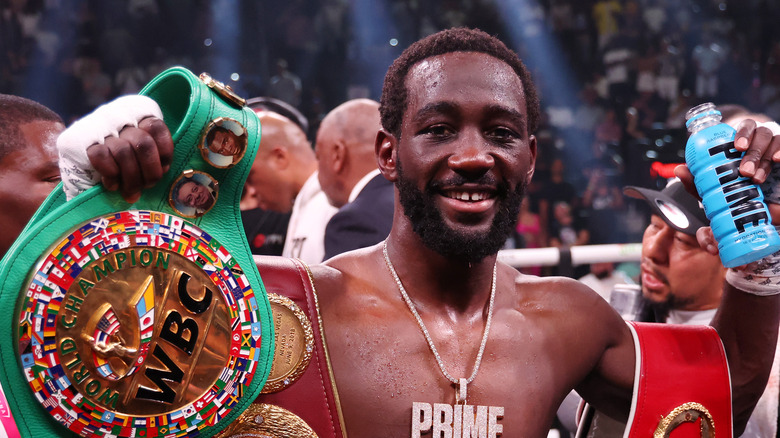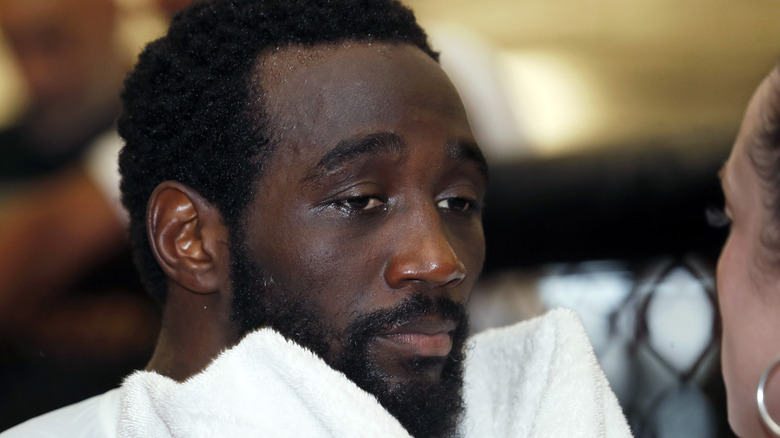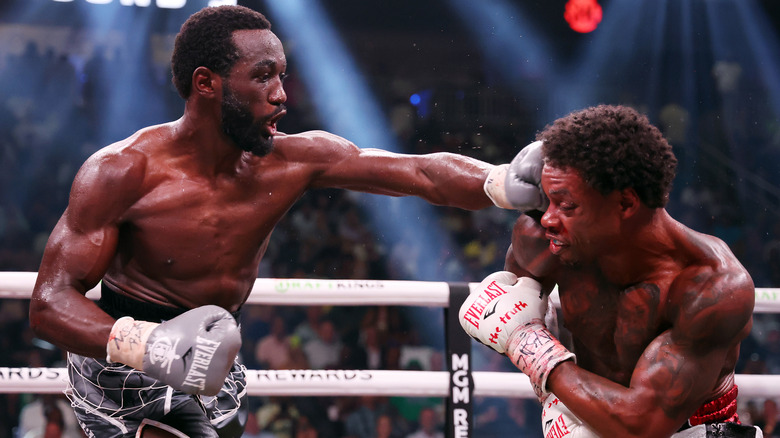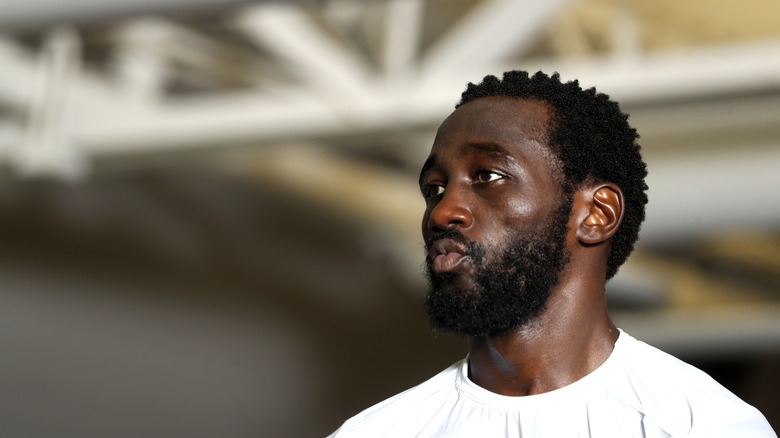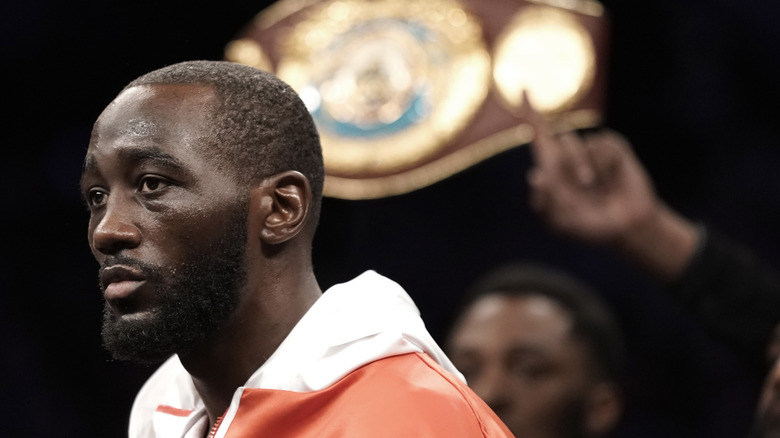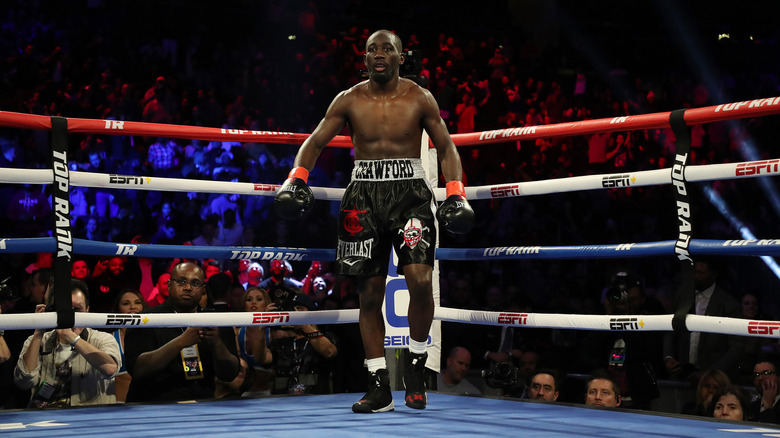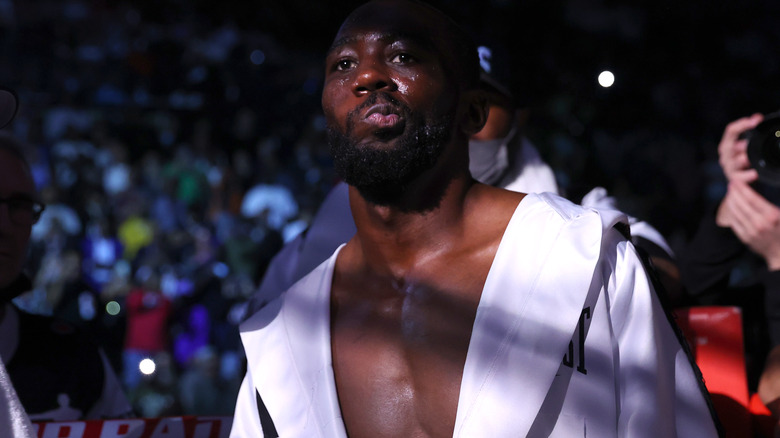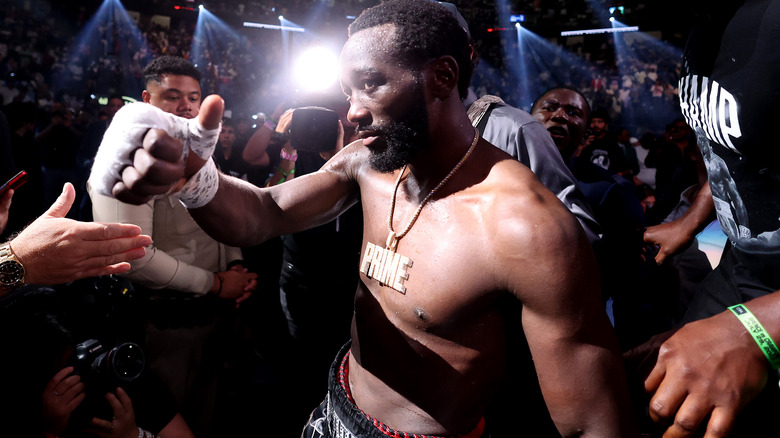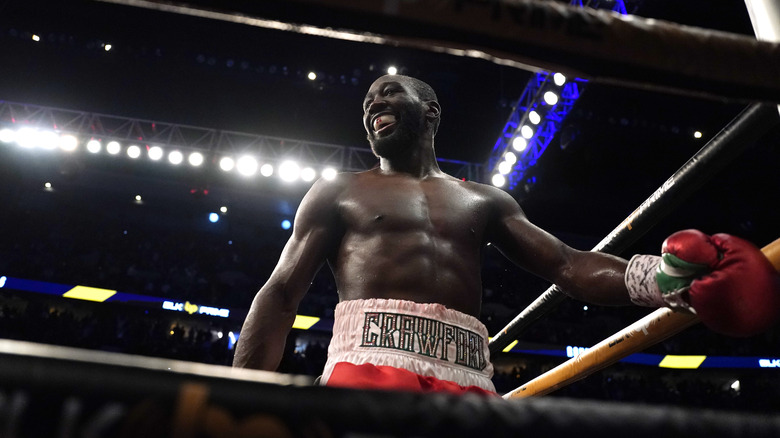The Tragic Story Of Terence Crawford, The 'Best Boxer In The World'
When The New York Times profiled Terence Crawford in 2017, it painted him as a person of many contradictions. On one hand, he was one of the best boxers ever to set foot in the ring, he was a loving father, he went out of his way to be a good role model, he opened a gym to mentor troubled youth, and — along with his former fourth-grade teacher — he embarked on volunteer missions to Rwanda. On the other hand, he'd dipped his toe into gang life, he'd been accused of pulling a gun to break up a fight, he'd been arrested for property damage, and when he was interviewed about being shot, once said, "I wasn't thinking about nothing but revenge. I wanted to find the guy and kill him."
To say that Crawford has overcome a lot is putting it lightly. Growing up in an Omaha neighborhood with a reputation for violence, he told CNN, "Man. I've been through a lot as a kid. But at the same time, that upbringing just made me stronger and made me more determined to make it out of here I made it out from, and just fight extra hard to not go back."
And fight extra hard, he has: As of 2023, he was sitting comfortably atop a 39-0 record, which included a whopping 30 KOs. Moving on from childhood trauma hasn't been easy, and Crawford says that his success in the ring is the result of channeling a lot of anger.
He wouldn't wish his childhood on anyone
It's no secret that adults are shaped — for better or worse — by their childhoods, and Terence Crawford has been straightforward about just how bad his childhood was. In 2023, he sat down for an interview with CBS Mornings, and talked about growing up in a rough Omaha neighborhood with a mother who was tougher than anything he might find on the streets. He shared the fact that he was still working through childhood trauma, and at the same time, he sort of understood her.
"That's my mom, and for her to treat me the way that she was treating me, not because of... she didn't love me. It's because of what she was dealt with. And, I wouldn't wish that on no kid," he said, and added that he was changing for his children: "I'm here for everything, no matter what's the situation or circumstances."
ESPN had previously recounted some of the things that Crawford had said about his relationship with his mother, known as Miss Debra. He recalled constant arguments between his parents along with constant drinking, and says that regularly getting hit by his mother prepared him for getting hit in the ring. "I done got hit with a belt, a toy, a stick, extension cord, a switch off a tree, whatever," he recalled. "At the same time, my pain tolerance went up... It came to the point where it built toughness. ... Yea, it hurt, but I wasn't scared. I knew what was coming. Wasn't nothing I wasn't prepared for."
Fighting was a matter of survival
For many kids, fighting is a terrifying prospect that might loom, ready and waiting, for the parking lot after school, or on the bus ride home. But for Terence Crawford, fighting was a way of life — so much so that it got him kicked out of five different schools. The logical place for a natural fighter was at the local boxing gym, and when he headed there, he found himself surrounded not mainly by kids his own age, but by members of the area's gangs — including the Crips and the Bloods.
It was there that he met his uncle's old sparring partner, Brian McIntyre. McIntyre would ultimately become Crawford's trainer, but it was still a long, hard journey, with his mother telling him the whole way: "I don't know why you training that hard. You gonna get your a** whupped."
And she literally made sure that it happened. Talking with ESPN, Crawford shared a story about growing up in Omaha and being "the typical bad kid, running in the neighborhood," and getting into all kinds of fights. His mother spoke, too, about wanting him to learn before he was a teenager that he shouldn't be afraid of anyone, and showed him just how to be tough by promising kids in the neighborhood $10 if they could beat up her son. She said there were a lot of kids who tried, but no one ever came close.
Being shot in the head helped him get on the right path
Everyone has those moments in life where everything changes in a split second, and for Terence Crawford, that happened when he was shot in the head. It was 2008, and even before that, it had been a bad night. Crawford got caught up in the middle of a fight between the Bloods and Crips, was maced by law enforcement, and then? Things went even worse.
He'd grabbed some food, then spent some time shooting dice and winning, and was sitting in his car when he heard somewhere around 12 gunshots. The back window shattered, a bullet grazed the back of his skull, and he drove himself to the emergency room. Initially, he was angry, telling his uncle (via ESPN), "I don't care if I go to jail the rest of my life. I'm going to kill him."
It was that uncle, DeArthur, who pointed out to him that yes, it had happened, and yes, it was terrible, but he had a choice in how he was going to deal with it. Later, his promoter, Bob Arum, told The Telegraph that the shooting gave him not only the determination that he needed, but the focus to choose a direction and go for it. And that direction and drive was a huge deal in making his career: "He had ... nothing going for him, other than his ability and determination."
He was haunted by the murder of his uncle
What scares someone who can knock out anyone who dares to go toe-to-toe with him? The murder of a family member, especially when that family member has long been seen as an older version of you.
In an interview with ESPN, Terence Crawford described having a major emotional reaction to the murder of his uncle, Michael. Not only were they close, but those who knew the family remembered Crawford as being very much like his uncle in his fighting style, his ambidextrous abilities, and his attitude. (Crawford's trademark left- and right- switch was something that his uncle did, too: Gym owner Carl Washington has explained that he believed it was an innate ability saying, "It comes natural. I always believed it was something in the line.") Tragically, he was young when he was forced to say goodbye. It's unclear exactly what happened to Michael or the person who killed him, but the family says he was stabbed by his girlfriend.
Crawford recalled the nightmares that came after: "I used to visualize the casket. I wanted to sleep with my mom. I couldn't even take a bath by myself, because I'm thinking someone's going to come get me," he recalled.
His mother's ridicule of his sparring partner hurt deeply
Terence Crawford told ESPN that he was 12 years old when his mother went to hit him, and that time, he grabbed the belt she was preparing to use on him. He made it clear that she wasn't going to hit him anymore, but there were other ways to hurt him. When 25-year-old Grover Wiley hopped in the ring opposite Crawford, he presented a challenge — and it was a challenge that let everyone know that the kid had some serious skills. Wiley continued to work with Crawford, and when he'd pick him up on the way to the gym, Crawford's mother would invariably summon him: "Your white daddy's here."
Wiley recalled the remark leaving Crawford in tears: His father, Terence Sr., was a Navy man and rarely around. Since then, he's been open about how difficult it was growing up without his father, particularly since his early memories of him are fond ones. Terence Sr. was fond of calling his son their "million-dollar baby," and Crawford said, "I used to cry when he left because my dad was like my best friend when he was there. ... He always told me he was proud of me..."
That sense of missing out on some serious father-son time growing up has made Crawford determined to be there for his own children. He told ESPN that it didn't matter what he was doing: "That's my responsibility, to be there as their father. You can't get those moments back."
He witnessed his aunt and her own struggles
Growing up, Terence Crawford had a front-row seat to his family's struggles, and that included those of his aunt, Jackie. Jackie lived with him, his mother, his grandmother, and his older sisters after her early release from prison. She'd been sentenced to a state facility after being convicted of cocaine possession, and was only released to live with them after she was diagnosed with cancer.
Along with cancer, Crawford recalled her struggles with addiction and schizophrenia, remembering her last days sitting on the porch of their family home. She passed away when he was 15, and according to ESPN, that there was still a certain amount of envy there for a heartbreaking reason.
Jackie, her family recalled, had been told by her mother — nicknamed Pee-Wee — that she loved her. They were words that Crawford never heard from his own mother, and always craved. "I never had the opportunity to run up and hug my mom and tell her 'I love you,' and she tells me she loves me and hugs me back," he recalled. "I would want her to come to my fights and support me, but it would never happen."
He was shot at... and then cuffed
Terence Crawford was in eighth grade when he made a promise to himself: He was never going to smoke, and he was never going to drink. He had, after all, seen enough of the latter, telling ESPN that his mother "had a problem with drinking," and that most of the beatings he endured came after she'd had a few beers. He'd also seen first-hand what the consequences of the gang life were, but he was still caught up in it — repeatedly — and said that the mentality was something he didn't just magically overcome: "I still had that in me," he acknowledged.
Crawford says that the time he was actually shot wasn't the only time he was shot at — and he's been caught in the midst of gunfire around 8 times. In one instance, he said that they had actually been aiming for his cousin, but his car took the bullets. He was uninjured, law enforcement arrived, and he was put in handcuffs and forced on the ground.
What followed was a brutal exchange: Crawford says that his mother tried to intervene, and law enforcement pulled a gun on her, too. They wanted to know why he always happened to find himself in the middle of such situations, and he answered, "Why you always harassing me?"
The heartbreaking fuel that's kept him angry
In 2019, Terence Crawford spoke to CNN: He was older, wiser, and had the benefit of not only hindsight, but of having his own family. He looked back on working his way out of a bad place, and it had been hard: "You've got to change your life, you've got to change the people that you hang out with, you've got to change your surroundings, you've got to change your train of thought," he said. "And I put all my time and my effort into the sport of boxing."
Crawford has changed a lot, but he's also said that the one thing that he hasn't changed is holding onto anger. In an interview with ESPN, he was asked if he'd stayed angry, and he said yes: His mother's constant insistence that he would lose his next fight, that he would never be good enough, and that he was only one step away from failure kept him there.
He explained that he had always thought, "When I win this tournament, she's going to say, 'Congratulations!' or 'Good job,' or 'I'm proud of you,' but it never happened." When his mother was asked about whether or not she had ever told him that she loved him, she simply said, "Nope." Crawford has been coming to terms with that: "When I got older, I noticed that it was her negative way that pushed me to be great." Now, he says, he tries to prove things to himself instead.
If you or anyone you know needs help with addiction issues or may be the victim of child abuse, contact the relevant resources below:
-
The Substance Abuse and Mental Health Services Administration website or contact SAMHSA's National Helpline at 1-800-662-HELP (4357).
-
The Childhelp National Child Abuse Hotline at 1-800-4-A-Child (1-800-422-4453) or contact their live chat services.
